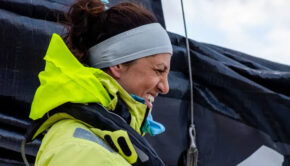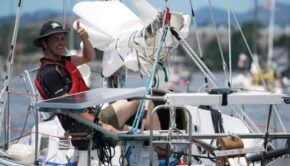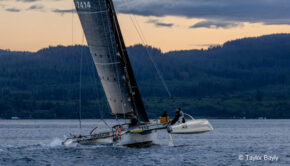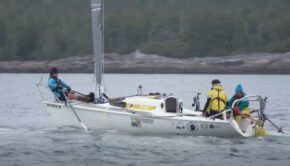R2AK: Because we need pain
Published on June 25th, 2018
When the 2015 Race to Alaska was first announced, the premise was so absurd it woke up a society needing a wake-up call. No engine or support along 750 miles no reasonable person would tackle. Sure, the $10,000 first prize got our attention, but there’s no free lunch in life, and the cost of that ten grand was high.
Four years later, our over-wired, over-stressed, over-politicized planet remains in need of some pain and suffering to remind ourselves that, as John Maxwell notes, “You cannot overestimate the unimportance of practically everything.”
And the 2018 edition of the R2AK delivered. Here’s the June 25 report from Ketchikan, Alaska:
Even for those who lack calloused fingertips and strained tendons commonly associated with “tracker finger,” just watching the dock in Ketchikan provides all the cues needed to predict the imminent arrival of another Race to Alaska team.
Regardless of the time of day (usually late) or amount of rain (usually a lot), the procession down the docks starts with people, then the cameras and microphones of local press plus the R2AK media team, then a bell on a stand from the Ketchikan Yacht Club, a sixer or two of congratulatory beer, a superfan in a Utilikilt (Hunter is there literally every time), and a uniformed customs officer.
Sometimes there’s also a guy playing bagpipes. Sometimes someone brings a shotgun. To date, these two have remained peacefully unrelated.
Fans crowd the docks, line the piers and breakwater, and wait for the first hoot from the first sighting to break the damn of pent-up enthusiasm and respect and what follows is a rolling wave of joyous elation that brings people together, lifting their voices, bagpipes, and the occasional shotgun blast to a heartwarming cacophony that serves as encouragement and an audible navigational aid for their final 500 feet.
 Yesterday, that scene played out six times as the first echelon of finishers touched the dock, rang the bell, drank the beer (or in one case root beer), cleared customs, and had one reaction or another to the bagpipes.
Yesterday, that scene played out six times as the first echelon of finishers touched the dock, rang the bell, drank the beer (or in one case root beer), cleared customs, and had one reaction or another to the bagpipes.
Following the 12:17 am champagne shower which greeted Team Sail Like a Girl (Melges 32), the next two teams hit the dock with intervals just long enough to make sleep more of a wish than a reality. The adrenaline and coffee-filled souls crowded the dock again at 2:04 am to welcome Team Lagopus (Olsen 30) and celebrate their steak knife-earning second place, and then again at 9:22 am for Team Wild Card (Santa Cruz 27) for their 3rd place finish which, in the words of a past R2AK would-be bronze medalist, “We’re the first team not to win anything!”
From the dockside celebration to an impromptu breakfast whipped up by a Superfan at the Ketchikan Yacht Club, a.k.a. the unofficial living room of the R2AK, human interactions ran the course from welcome to celebration as handshakes turned to hugs exchanged.
With equal rapidity a fresh boatload of 750 miles of stories unloaded one wave at a time with the kind of detail that only those closest to it could understand in the way that the teller needed to be understood. With as little filter as possible, here are our highlights from each of today’s celebrations:
Team Lagopus:
Team Lagopus was a two-year effort to take a crew of Canadian mountain types to the summit of R2AK’s Alaskan Everest. They came up deuces.
On rowing: “(The final day) we just got stuck and rowed for 13 hours.” The crew of four had a rotation. “You do twenty minutes on the right oar, twenty minutes on the left, then fall on your face in the cabin for 40 minutes and then someone would wake you. We had to wake up twelve times from a dead sleep in a single day.”
On competition: “The best time of the whole trip was Bella Bella. We came up through the islands from the side, Sail Like a Girl came up from the channel on the outside, and Wild Card came up from the other side of Lama passage, and we all met at the same time from three different channels, and it was like ‘NO! There’s Wild Card again. Sneaky! Sneaky!”
“In Seymour Narrows, we had to tack away to avoid Wild Card, and in Bella Bella, they had to tack away to avoid us. They kept sneaking up on us in unexpected places because unlike us they know how to sail!”
200 miles later and the two boats purchased off Craigslist for the race were still on top of each other.
On the boat-to-boat camaraderie:
Team Lagopus: “I yelled R2AK, and you just said ‘Good morning!”
Team Sail Like a Girl: “We couldn’t hear what you said, but we were a little jaded. When Wild Card passed us in Johnstone, they just cackled at us.” – Karmic circle, bro.
With the community spirit that defines them, Team Sail Like a Girl met their closest competitors and shared the coveted mudslide cookies their family had brought. They debriefed the inside the island/outside the island strategies they alternated with Lagopus in the stretch past Bella Bella, where they hit a log, stopped to assess damages, and then assumed they had let the lead slip.
Team Sail Like a Girl: “We thought we were done.” It wasn’t until cell service wafted in from Prince Rupert that they knew they had the lead “We thought you had caught that southerly and took off. But once we got the tracker up again, it was like: ‘Wake up, get on the bikes!’” For the last day, they could see each other’s sails, which seemed to get alternately closer or farther depending on which glass-half-empty/full perspective you happened to be sitting in.
“I’ve followed this since year one, and I had tracker junkie withdrawal because I was racing.”
Team Wild Card:
Liveaboard buddies from D-Dock of Seattle’s Shilshole Marina, Team Wild Card was an everyman hero team that sailed for the dirtbagger set. Not the fastest, not the best financed, and certainly not the best looking or smelling, their Bad News Bears team was rife with local talent, experience, and the can-do ‘Let’s buy it from Craigslist’ attitude that spawned this whole thing in the first place.
On their post-Bella Bella move offshore into Hecate Strait:
“We sailed out there really fast, the whole plan was to get out to the west—the weather forecast said the northwesterly was supposed to fill in at 10-20. We wanted the big breeze; our strategy was to go west and then when the shift happened flop over and go north and beat everyone to the north.” The shift never happened, instead of a build the wind pooched and left them bobbing offshore.
When yours is the slower boat, you have to gamble. In the words of a fan, “Sometimes you get the elevator, sometimes you get the shaft.” Shafted and stuck, Wild Card sailed in shifts, getting three hours of sleep at a time “…at the most. We were all over the place trying to sail it fast—there was a lot of ‘All hands on deck, gotta go.’”
They were in the trapeze whenever there was wind. “Adverse conditions were going to be our edge.” They wanted the big breeze and chop that R2AK was known for. “The trapeze lays the boat down, but the thing that people don’t think about is its effect on leeway. With the keel down you don’t slip as much, and you can climb all day.”
On the gamble that paid to shoot the gap between Texada and Lasqueti Islands on Day 3: “I texted my wife and said ‘I’m making a decision, and it’s either going to be really good or really bad.’ It turned out it was really good…”
Team Ptarmigan (F-28 tri) and Team Strait to the Pool Room (Shaw 34 cat):
The vanguard of this year’s multihullers came in nearly on top of each other, and practically on top of the breakwater. Ptarmigan’s three hulls and two generations getting in just before the departing cruise ship cast off lines and blasted Strait to the Pool Room’s twin hulls with 5,000 horsepower of bow thruster, casting them sideways and helpless towards the rocks. All ended fine, but 749.9999 miles of phenomenal was a gnat’s hair away from realizing calamity’s last-ditch bid for a headline. All safe, all alongside.
On their top speeds:
“We were surfing at 17.2.”
R2AK: (inaudible facial expression meant to indicate ‘HOLY HELL!!!’)
On 3rd-party provisioning:
“No one air-dropped any milk for our tea.”
On the competition:
“We went for it because you were there. We had a great time.”
On the engineless cruising:
“It’s a game changer. You make totally different decisions without a motor. With a motor, if there’s a bad tide you just say ‘Well, we go a little slower.” When you have to row, you think twice about it.”
Team BlueFlash (J/88):
The team of four had an average age of 19.4 when they started the race (one just graduated high school a few weeks ago) and might be the only team where the length of the race might alter that average significantly. Their race was one of competent prudence that outpaced their age. They arrived unscathed, boat intact, and other than burgers on the mind none the worse for wear.
Team BlueFlash: “In the R2AK spirit we’d like to start a tradition for the youngest team in the race. In this bag are our sporks—we’ve all signed them. We’d like the youngest team in the R2AK to carry them for good luck.”
Race Boss: “Did you wash them?”
Team BlueFlash: “No.”
Proud dad: “You guys sailed 218 miles in the last 24 hours.”
Everyone else: “WHOOOOO!”
Team Sail Like a Girl: “So what was it like sailing with a boat full of boys?”
Maisey, Team BlueFlash: (laughter)
Team BlueFlash: “I think we’ve proved that a bunch of young and stupid people could sail a really good race.”
Tim Penhallow, Team Boatyard Boys (2015): “Well, thanks for coming and joining the old stupid people.”
As the sun set on the official awards ceremony and the block party that mixed Ketchikan regulars with R2AK’s temporary residents, old and young, stupid and stupid alike. The celebrations continued into the long Alaskan night.
Race details – Team list – Tracker – Facebook – Instagram
Background:
Race to Alaska, now in its 4th year, began with 47 teams signing up for the adventure of a lifetime. No motor, no support, through wild frontier, navigating by sail or peddle/paddle (but at some point both) the 750 cold water miles from Port Townsend, Washington to Ketchikan, Alaska.
To save people from themselves, and possibly fulfill event insurance coverage requirements, the distance is divided into two stages. Anyone that completes the 40-mile crossing from Port Townsend to Victoria, BC can pass Go and proceed. Those that fail Stage 1 go to R2AK Jail. Their race is done.
Thirty-nine conquered the first test on June 14, of which 31 lined up on June 17 for the start of Stage 2 from the southern tip of Vancouver Island. Other than two waypoints along the way, Seymour Narrows and Bella Bella, there is no official course. Race details.
Source: R2AK









 We’ll keep your information safe.
We’ll keep your information safe.